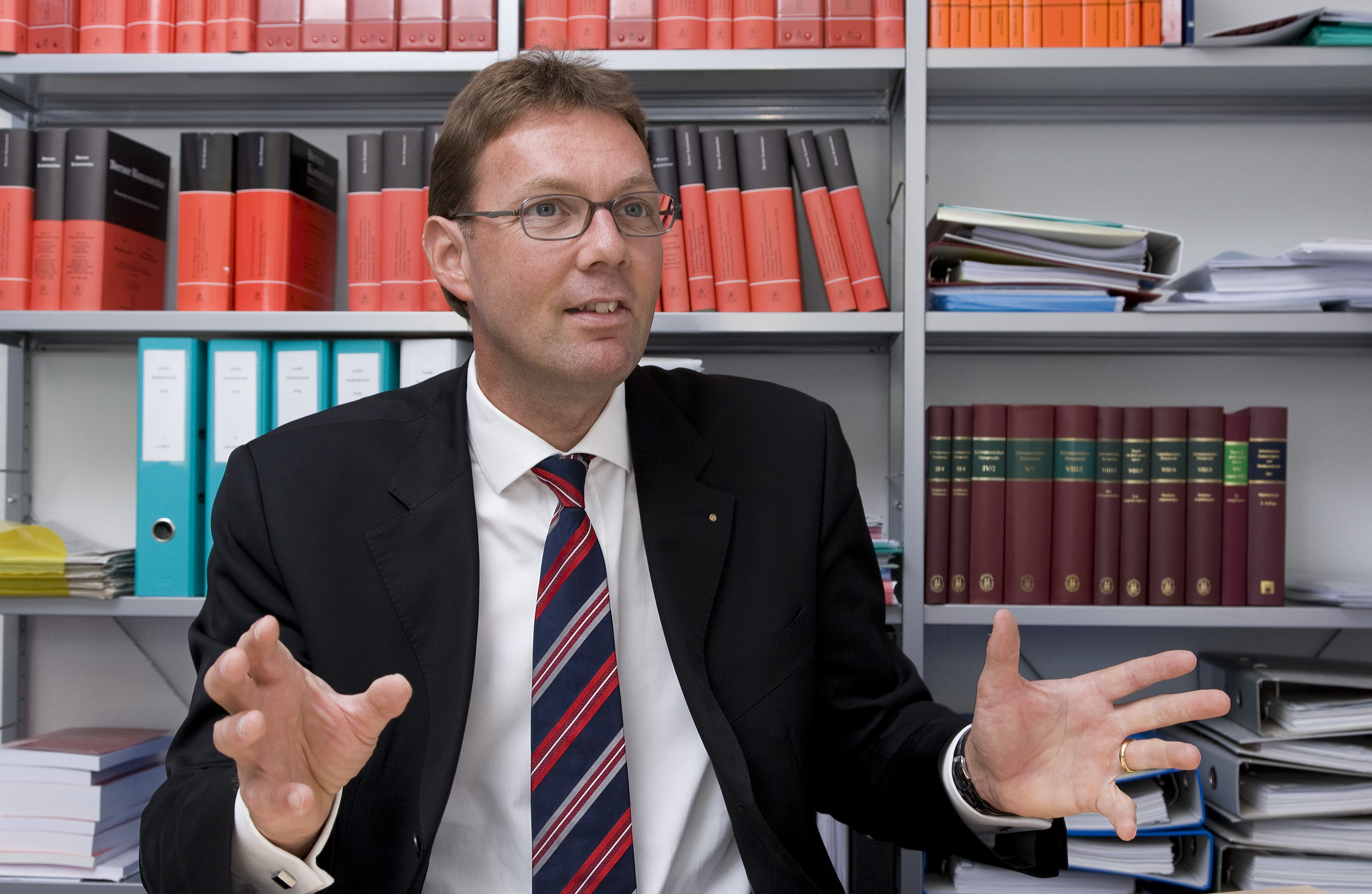‘Dougan and Rohner rightly remain at the helm’

Top managers at Credit Suisse bank shouldn’t have to step down, despite the $2.8 billion (CHF2.5 billion) fine from US justice authorities, says Peter V. Kunz, expert on international corporate law.
However, he wonders about Board Chairman Urs Rohner’s former role as the bank’s top legal counsel.
swissinfo.ch: Credit Suisse, the Swiss government, the banker’s association and the National Bank have all welcomed the news of the deal. How do you view the outcome? Is it good for the bank and for Switzerland as a financial and business centre?
Peter V. Kunz: It’s an expensive outcome for Credit Suisse, but a positive one. The legal uncertainty tied to it was a major burden for them. Even though the fine is very, very high, it’s now in the past and it’s possible to look ahead.
It’s also good for the Swiss financial and business sectors, especially because emergency law never had to be applied.
swissinfo.ch: Amid the general relief, the negative consequences could almost be overlooked. How significant is the damage to Switzerland’s image and the country’s financial sector?
P.V.K.: The damage has already been done. For many years, Switzerland and Swiss banks have had a reputation for being a place where people could stash illicit funds. This image has been perpetuated for years, first with UBS, then Credit Swiss, then with the US banking programme. I don’t think that the damage has increased because of this case.
swissinfo.ch: From an outsider’s perspective, it’s hard to understand why Credit Suisse’s top management didn’t react more quickly instead of walking right into the Justice Department’s penalty. How do you explain that strategy?
P.V.K.: I’m not sure that Credit Suisse really had very much room for negotiation. The Swiss government took the lead when things escalated for UBS five years ago; the negotiations with then State Secretary for Economic Affairs [Michael] Ambühl and Finance Minister [Eveline] Widmer-Schlumpf put the banks back in second place. That’s why Credit Suisse hasn’t even been in the position to solve its problem through its own negotiations over the last three or four years.
It was just last year, after the failure of Lex USA [where parliament voted down a law proposed by cabinet to end the tax fight with the US], that the government rightly pulled back and said the banks should solve the problem themselves.
With those parameters, Credit Suisse solved its problem – while operating within the bounds of Swiss law – in a year’s time. I don’t think the bank played any tactical games, as some people have implied.
swissinfo.ch: After UBS was fined in 2009, Credit Suisse took on an offensive role, branding itself as a “clean” bank when it came to doing business with US clients. Was all that just a PR campaign?
P.V.K.: I was also very surprised. Five years ago, when UBS’s problems were made clear, Credit Suisse declared for many months that it didn’t have those problems. Now I am surprised about the concessions Credit Suisse made in the “Statement of Facts” [accompanying the court proceedings] because its involvement with the US in this area was apparently not so small after all.
What strikes an especially negative chord is the apparent destruction of proof by the bank. E-mails were erased and employees who left the bank were not questioned, which is not only common but expected in the US. Credit Suisse leaves behind the impression that it tried to cheat. In retrospect, that surely wasn’t a smart move.
swissinfo.ch: Is Credit Suisse’s Chairman Urs Rohner really right to say he is innocent in the matter?
P.V.K.: I think it’s right that he’s not stepping down, first of all so as not to de-stabilise the markets. Going against calls from politicians for them to step down, Chairman of the Board Rohner and CEO Dougan are, for the moment, still in their positions – as it should be.
But Rohner has worked for Credit Suisse for a long time, and not always on the board of directors, where you can say you weren’t involved in daily operations. For years, he was the head lawyer and general counsel for Credit Suisse, so he was directly involved in these problematic situations.
His current role as chairman could well remain undisputed. But his previous life as head lawyer and general counsel presents questions that the board of directors and shareholders should examine at some point.
swissinfo.ch: Aside from the aforementioned charges, the US justice department accused Dougan and Rohner of failing to co-operate with the investigation. Is the duo at the head of Credit Suisse really off the hook?
P.V.K.: I think so, when it comes to US criminal and regulatory law. The US authorities could absolutely have called for the dismissal of both of them, but they didn’t, probably also because of the impact it would have on the markets.
There’s also the completely separate question of whether there will be civil lawsuits against Credit Suisse and its management. It’s possible that American shareholders and customers will file claims for compensation.
swissinfo.ch: How does it look for the other 13 Swiss banks that are involved with criminal proceedings with the US authorities? Does the Credit Suisse settlement indicate anything for them?
P.V.K.: You have to differentiate between two things. First, the fine: it will serve as a model for the other Swiss bank cases. There’s no basis for calculating the fines, so it’s quite arbitrary on the part of the US. So it will surely get more expensive than expected for the rest of the banks.
The guilty plea, or the admission of guilt, shouldn’t present a problem for the other 13 banks if you believe their initial assessments. The Zurich Cantonal Bank has said for years that it was never directly involved with US clients but worked instead through independent trustees. So I assume these banks will have fewer problems than Credit Suisse.
swissinfo.ch: So there’s no risk that one of these banks could face the same fate as Bank Wegelin, which ceased to exist?
P.V.K.: No. Wegelin was a special case, because they very knowingly carried on this business, which those responsible admitted themselves. The other banks were present in the US but didn’t pursue that clientele as actively as Wegelin.
swissinfo.ch: Credit Suisse admitted its guilt. Can American clients breathe a sigh of relief, or could the IRS still get its hands on their names?
P.V.K. There’s absolutely no sigh of relief for American clients. The bank client data won’t be sent under special emergency legislation, but there is of course the possibility of administrative procedures. Cabinet assured that it would help with such administration and that it is hiring additional personnel to do that. Not today, but probably in the next two or three years, US authorities will have access to almost all the names of American clients.
swissinfo.ch: Is the high fine and the guilty plea by Credit Suisse the beginning of the end of the tax fight with the US?
P.V.K.: Three weeks ago, I wrote in a column that the tax fight was, in principle, over. The only thing still missing is the bill for the Swiss banks’ financial transgressions. I think this will be confirmed. The tax fight is over when it comes to questions of emergency law and political support from the state. The only thing still open is the final bill, that looks to be very expensive.
The bills will also be very high for the 106 banks that signed up for the US programme. But they should be able to survive, without question.
In the next two years, there could be problems for those banks that didn’t take part in the programme but were involved in aiding US tax evaders. It could be that one or another small Swiss bank suffers the same fate that Wegelin did.
(Translated from German by Veronica DeVore)

In compliance with the JTI standards
More: SWI swissinfo.ch certified by the Journalism Trust Initiative

You can find an overview of ongoing debates with our journalists here. Please join us!
If you want to start a conversation about a topic raised in this article or want to report factual errors, email us at english@swissinfo.ch.